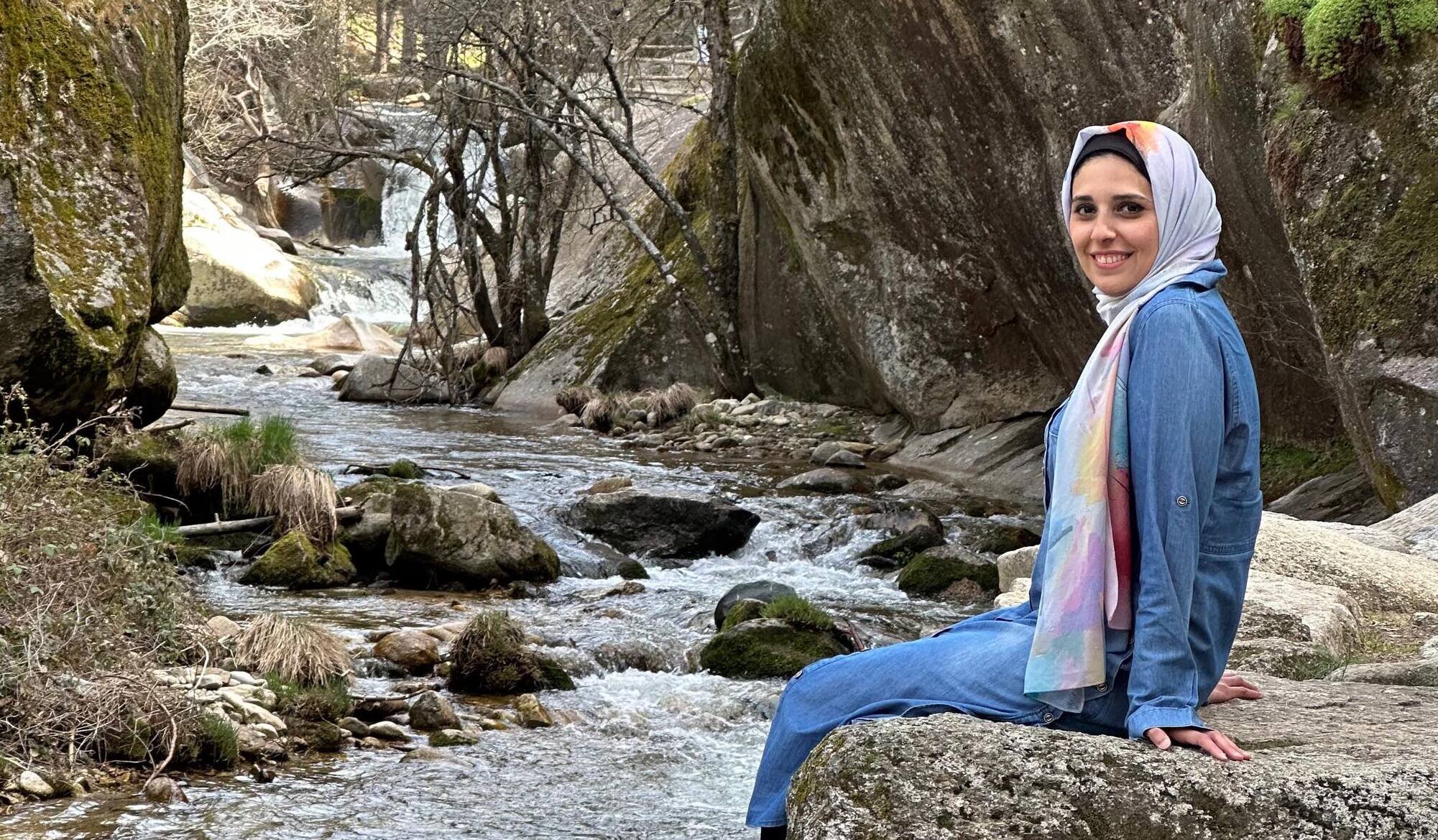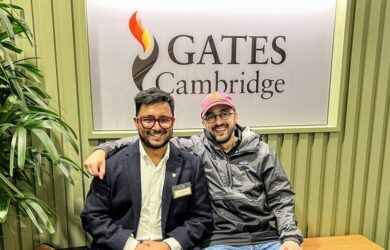
Mai Abdelgawad on her research into the fatal motor neuron disease ALS and her volunteer work on education and science
While aspiring to pursue a passion for research is commendable, it becomes truly meaningful when it serves humanity.
Mai Abdelgawad
Mai Abdelgawad’s research is about understanding the genetic factors affecting brain and spinal cord development in younger people with Amyotrophic lateral sclerosis [ALS] disease, a fatal motor neuron disease that causes progressive degeneration of nerve cells in the spinal cord and brain.
Her PhD, which she started in the autumn of 2024, focuses on juvenile ALS. She aims to explore the impact of mutations that cause early-onset disease on cortical development using a 3D human neural organoid system (a mini brain on a dish, which, in vitro tissue, resembles parts of the human brain). By understanding this, she hopes to identify epigenetic regulators that might contribute to disease development and can be targeted for new drug treatments.
She says: “The mutation that causes ALS remains unclear. Using the neural organoid model will be a useful platform to study and understand how ALS affects neurogenesis [the process of creating new neurons in the brain], and it will be very important for drug design.”
She is passionate about her research making a difference, saying: “While aspiring to pursue a passion for research is commendable, it becomes truly meaningful when it serves humanity”.
The PhD will build on her previous research in neuroscience, stem cells and brain development, which she came to through an unusual route – after years of working in veterinary medicine.
Early years
Mai [2024] was born in Beni-Suef in Upper Egypt. Her father died when she was five and her mother, a teacher, raised her and her four siblings. She went to school a year early, accompanying her mother the year before she was due to enrol. Her sisters also taught her, meaning she started school primed to learn and was at the top of her class throughout her education. Mai says: “I am deeply grateful to my mother and siblings for their unwavering love, sacrifices and support in shaping the person I am today.”
During her childhood, Mai had two different groups of school friends – some linked to her interest in science and others to her extracurricular activities and she says she learned from both. She played piano and accordion and took part in many music competitions, winning both the music cup for her city and for Egypt for her accordion playing. She was also a member of the school handball team.
University
Mai was interested in genetics from an early age and wanted to go into either human or animal medicine. She did her undergraduate degree in veterinary medicine at Beni-Suef University. During the course, Mai found she enjoyed basic medicine more than clinical medicine, particularly studying diseases that were not fully understood.
Mai’s passion for science began during her bachelor’s studies. However, due to limited research facilities and funding opportunities, she couldn’t pursue a master’s immediately. Instead, she worked as a vet until 2017 when she made a deliberate decision to pursue a career in research.
She pursued postgraduate degrees in Biotechnology and Bioinformatics in Egypt, graduating at the top of her class, before starting a master’s in Biotechnology and Life Sciences at Beni-Suef University. Her thesis focused on the role of noncoding RNAs in coronary artery disease. During her master’s, she also worked as a research assistant on cardiac and neuronal regeneration, which entailed scaffold construction with stem cell seeding to enhance tissue regeneration.
She was also keen to pursue her passion for neuroscience so she did a second master’s degree in Neuroscience at the University of Bordeaux in France. In her first year, she worked on cortical development using brain organoids at the Paris Brain Institute, exploring its relevance to conditions like epilepsy. In her second year, she received an a scholarship to complete her thesis at the Centre for Molecular Biology Severo Ochoa of the Autonomous University of Madrid in Spain. Her research focused on the role of the epigenetic regulator CHD2 in cortical development and neurological disorders, again using brain organoids. Mai graduated as the top student in her programme, earning the highest thesis grade among her peers. Throughout her studies in Egypt and France, she secured competitive, fully funded internships at prestigious institutions in Japan, the USA and Europe.
After completing her master’s, Mai joined the Lakatos Lab in the Clinical Neuroscience Department at the University of Cambridge as a research assistant, where her work focused on cortical development in relation to ALS. The multidisciplinary nature of the lab allowed her to engage in diverse projects and broaden her expertise, preparing her for her PhD.
Volunteering
Volunteering has always been a significant part of Mai’s life, and she has balanced this work alongside her studies.
During her final two years as an undergraduate, Mai volunteered for human development charities, assisting blind individuals in Egypt, where schools for the blind and access to books were scarce. She translated books into Braille and read aloud to promote equal learning opportunities. She also volunteered with charities that provided medication and healthcare to underserved areas.
In addition, she joined the Life Makers Foundation to work on an adult illiteracy project sponsored by Vodafone. It involved establishing classes that aimed to eradicate illiteracy by helping adults in small villages learn to read and write.
Mai later joined another project aimed at improving the income of underprivileged families by providing sustainable initiatives, such as tricycles, to enhance their economic stability. She also served as project manager for the ‘Our Health’ team, organising medical convoys, blood donation campaigns, healthcare services and diagnostics for remote villages which had little to no access to medical care. Mai continued working with Life Makers until 2020, contributing to various projects in roles ranging from team member to team leader and coordinator.
Mai’s volunteer work has gradually coalesced around science and research and she has taken part in initiatives and organisations that support young Egyptians and Arabs in shaping their scientific and educational journeys. For instance, she volunteered to teach science to children in a simple and engaging way. She says: “I believe that the nation’s renaissance starts from well-educated, healthy kids.”
One organisation Mai is particularly proud of and to which she continues to contribute while at Cambridge is ‘Egypt Scholars’, a network of Arab scholars and researchers educated abroad who share their expertise to help others pursue similar opportunities. The organisation offers mentorship, educational sessions and resources, including books on studying abroad and guides to scientific research.
Mai volunteers with teams that publish scholarship opportunities, assist with applications and provide scientific guidance. Recently, she gave a webinar for the organisation about the Gates Cambridge Scholarship and the application process to Cambridge University, entitled ‘Unlocking Opportunities: Your Roadmap to Cambridge University and the Gates Scholarship’.
She also continues to volunteer with smaller initiatives, offering sessions on scientific research and skills development. At Cambridge she aims to advocate for female STEM researchers, mentor students and encourage more Egyptian students to study abroad and bring cutting-edge knowledge back to their country.
She states: “I am grateful for the opportunity to join the Gates Cambridge community and feel privileged to contribute to a group that equally values intellectual and social excellence.”












